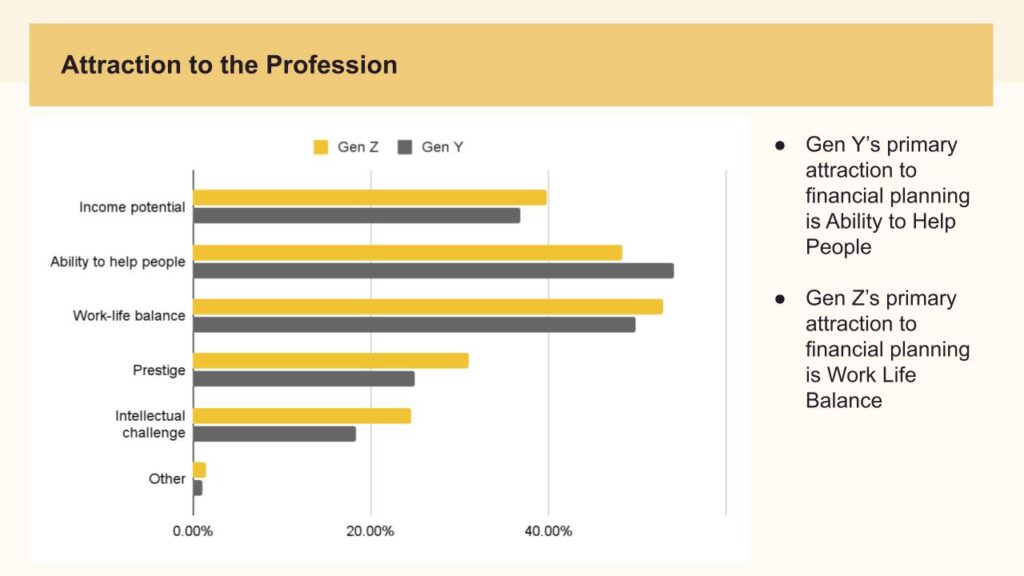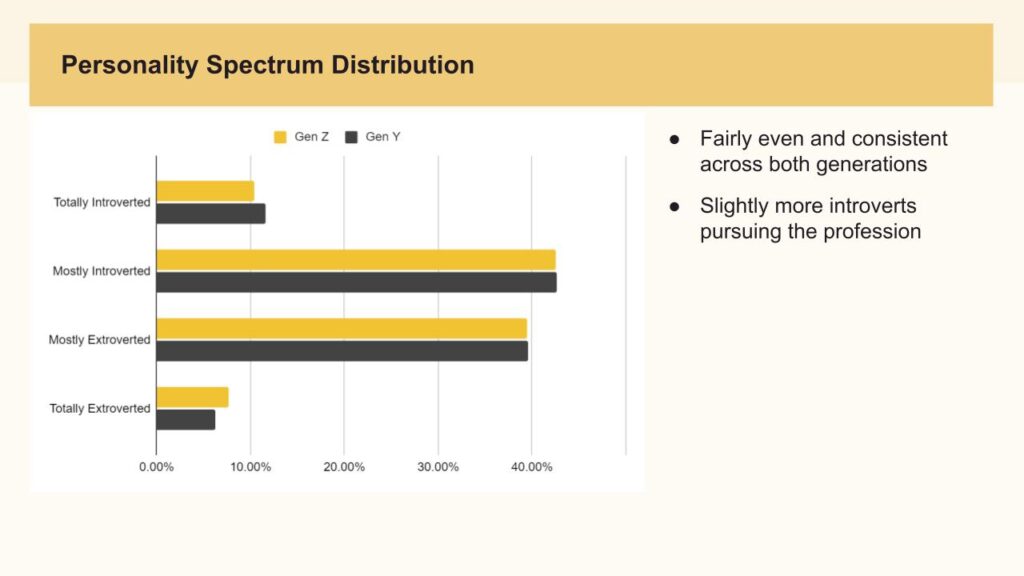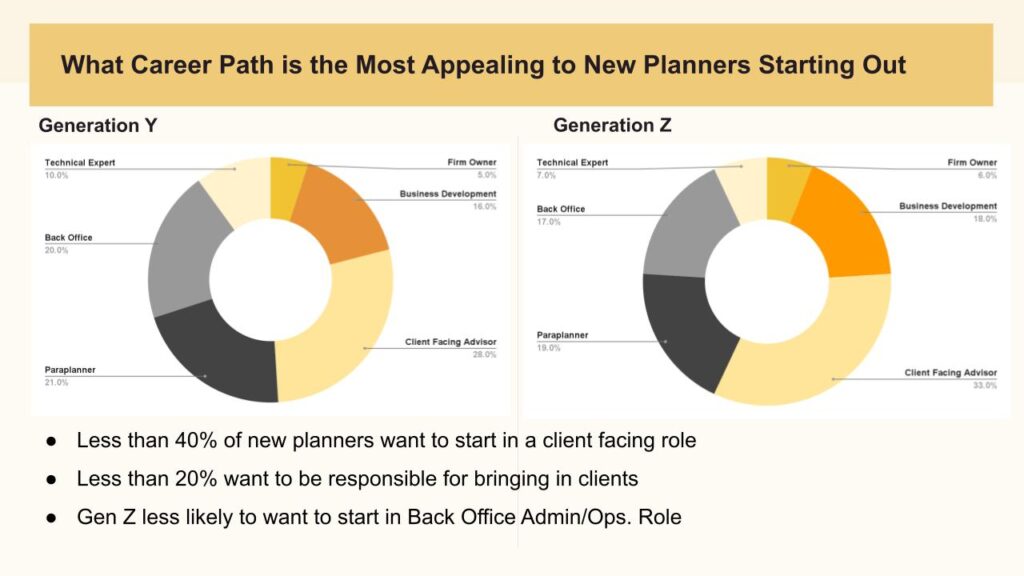Earlier this year we surveyed 665 Generation Y planners and 275 Generation Z planners to get their thoughts on their career satisfaction, and what drives that satisfaction (and from the firm’s perspective, their retention!). In this anonymous survey, we hoped to gain additional insight into what we see anecdotally each day as we interview job seekers for financial planning roles across the country about what they’re really looking for that will make them “stick” with the job and firm they’re applying to.
Our hope for sharing this data with you is you will have one of two outcomes: 1) Ideation - learn something new you can implement into your business; or 2) Confirmation - that you fully understand your next generation advisors, and what your team members may not be expressing to you verbally, to confirm that you are doing everything right.
Career Satisfaction Research Survey Overview
Our Career Satisfaction survey questions ranged from their why on choosing the profession, how satisfied they are with their career path, promotion expectations, views on management/leadership, and compensation and benefits. We plan to share these results over the next few monthly newsletters. This month we are going to set the stage by exploring some demographic information, reasons for choosing the profession, and the career paths that are most appealing to next generation advisors when starting out.
As a refresher, Generation Y, often referred to as Millennials, were born ~1980 - ~1995, and there are roughly 72 million members of this generation. Generation Z were born ~1995 - ~2010, and there are roughly 70 million members of this generation.
Why are new planners in each of these generations pursuing a financial planning career? As you can see from the chart below, the Ability to Help People and Work-Life Balance were the most cited reasons, followed by Income Potential.

One key takeaway here is ensuring you have incorporated Work-Life balance into your culture. This can be as straightforward as closing the office early on Fridays during the summer months, which are sometimes slower. Flex scheduling when it comes to work hours for people for whom the standard 8 am - 5 pm doesn't work as well (especially given that next generation advisors tend to be of the age when they’re starting families, and have to navigate school drop-offs, child care pick-up, etc.). Furthermore, as many of you have already done, implement a hybrid work policy, where a certain number of days are in the office, and the remainder are work-from-anywhere, is a popular Work-Life balance benefit.
Our findings show that next generation advisors do also want to make money and be paid well - income potential was a material factor - but there are some trends and nuances around the compensation aspect that we will explore further later on.
Personality Trends in the Profession
We also thought it would be interesting to get a sense of how newer entrants classify themselves in terms of introversion and extroversion to help decipher some of the other areas we analyzed later on the survey. And notwithstanding the traditional stereotype of the extroverted business-development-oriented financial salesperson, our results find - similar to Kitces Research on financial advisors - that there is not an extroversion tilt amongst financial advisors, and in fact amongst the incoming generation there is actually a slight leaning towards being an introvert instead!

Firm owners ask me all of the time which personality type has the highest success rate in the profession. It’s really the wrong question to be asking, versus ‘which position in my financial planning firm is best for ________ personality type?’ Over the last 21 years, I have seen many introverts and extroverts have massive success in the profession.
Because the reality is that while extroverts may do better at traditional broad-based networking or cold-calling style approaches to marketing, introverts can also be highly successful with business development (they simply choose less crowded and more intimate approaches to build one-to-one relationships). And the tendency for introverts to have fewer strong ties (as compared to the extrovert’s high volume of weak ties) arguably positions introverts even better than extroverts for roles with a heavy ongoing-client-service component!
That being said, this can be challenging if you as the firm owner/founder are an extrovert, and naturally more talkative and outspoken than some of your more introverted next generation team members. Keep this in mind, when you are working with new planners in client meetings where your natural tendency may be to completely take over (which doesn't provide as many learning opportunities for your newer planners). Also, since introverts need downtime to recharge - understand that your planners who are introverted may not be able to conduct as many client meetings per day as you can/did. I remember early in my career being exhausted after two 2-hour client meetings in a day, and being awestruck by more experienced and more extroverted planners who could go all day long!
Ideal Career Path When Starting a Career

When new planners are starting, most do not want to be in a client-facing and/or business development role right away. This may seem contradictory, since they cited Ability to Help People early on, but our take is they are feeling unprepared - lacking technical knowledge, experience, and the associated self-confidence - to work with clients right off the bat. And most do not possess a network to source high-net-worth clients, either. This after all is probably why they are looking for a salaried role with your company (and not just taking a big-firm sales job right out of the gate)!
Firms that do not require new planners to bring in clients at the beginning of their career, and firms that offer an apprenticeship model of gradually exposing new planners to the client-facing activities and the important-yet-delicate work that goes into that part of the job, are better positioned to attract and retain the next generation of planners.
Stay tuned for next month when we dive into what are the most fulfilling parts of the job, promotion expectations, and views on leadership/management.
Feel free to contact us at blog@newplannerrecruiting.com if you have any questions and/or would like to hear more about how we have alleviated many of the headaches over the last 15 years that plague financial planning firms when hiring.


Great research with some much needed insight into what motivates the next generation of advisors. Illuminating the development path and creating activities that build proficiency and confidence is what is most needed.
Love the insights here! As our firm of advisors slowly inch away from the coming-of-age young advisors, these are the kinds of insights needed to stay ahead in the financial services industry.
Great reading all of this, we’re hiring more new planners (planning analysts as we call them before they earn their CFP) and it’s nice to see what we’re thinking lines up with what the marketplace seems to go!